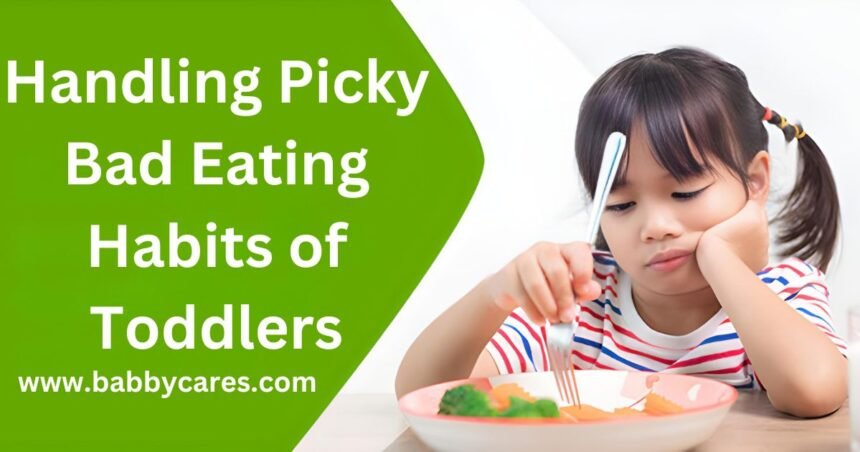Toddlers are often given junk foods like chocolates, chips, burgers, pizzas, ice-creams, biscuits, sweetened beverages, and other Handling Picky Bad Eating Habits of Toddlers readymade food options on a regular basis. Do you have an idea of how hazardous these can be to your precious little humans? If not, read on Handling Picky Bad Eating Habits of Toddlers to understand the negative impacts and learn how to handle picky bad eating habits of toddlers.
Read More: The Sleep Struggle
The Negative Impacts of Junk Food on Toddlers
- Reduction in Comprehensive Speed: Junk food can slow down a toddler’s cognitive development, affecting their Handling Picky Bad Eating Habits of Toddlers ability to learn and process information.
- Heart Issues in Future: Regular consumption of junk food can lead to heart problems later in life, setting the stage for chronic health issues.
- Slow Grasping Ability: Poor nutrition from junk food can hinder a toddler’s ability to grasp new concepts and skills.
- Bad Physical Strength: Junk food lacks the essential nutrients needed for physical growth and strength, leading to weaker muscles and bones.
- Aggression: High sugar and artificial additives in junk food can cause behavioral issues, including increased aggression.
- Digestive Issues: Junk food can lead to digestive problems, including stomach aches, bloating, and discomfort.
- Bad Dental Issues: Sugary snacks and beverages can cause tooth decay and other dental problems.
- Allergies: Some junk foods contain allergens that can trigger allergic reactions in toddlers.
- Constipation: Lack of fiber in junk food can lead to constipation and other bowel issues.
- Low Immunity: Poor nutrition weakens the immune system, making toddlers more susceptible to illnesses.
- Sleep Disorders: High sugar and caffeine in junk food can disrupt sleep patterns, leading to sleep disorders.
Tips for Handling Picky Eaters
1. Eliminate Junk Food from Home
The first step is to remove Handling Picky Bad Eating Habits of Toddlers all junk food from your home. If you have a handful of chocolates and biscuits, eat them rarely when your toddler is not around.
2. Introduce Home-Cooked Food Early
Start feeding your toddler home-cooked Handling Picky Bad Eating Habits of Toddlers food as soon as they start solids. Avoid giving Handling Picky Bad Eating Habits of Toddlers them outside food to help them get used to healthy options.
3. Offer a Variety of Healthy Foods
Provide a variety of fruits, vegetables, and Handling Picky Bad Eating Habits of Toddlers other healthy foods. Let your toddler choose from these healthy options.
4. Avoid Unhealthy Foods
Do not introduce unhealthy foods to your Handling Picky Bad Eating Habits of Toddlers toddler. If they discover them outside, explain that these foods are not meant for them.
5. Plan Meals and Eat Together
Plan meals each day and sit together as a Handling Picky Bad Eating Habits of Toddlers family for each meal. This helps toddlers understand the right times to eat and avoid skipping meals.
6. Healthy Snacks Only
Avoid outside snacks completely. Offer fruits Handling Picky Bad Eating Habits of Toddlers, whole grains, and homemade healthy snacks instead.
7. Understand Hunger
Give food only if your toddler asks for it. Let Handling Picky Bad Eating Habits of Toddlers them understand what hunger is and that only good food will satisfy it.
8. Explain the Harm
Explain the harm of unhealthy snacks to your Handling Picky Bad Eating Habits of Toddlers toddler. Give them very little when they spot others munching on them.
9. Make Healthy Treats at Home
Try making biscuits, chocolates, ice cream, and Handling Picky Bad Eating Habits of Toddlers cakes at home using healthy ingredients. Use recipes available online.
10. Prioritize Home-Cooked Meals
Don’t let your busy schedule affect your toddler Handling Picky Bad Eating Habits of Toddlers’s health. Home-cooked meals are the best.
11. Communicate with Extended Family
Explain to your extended family what and how Handling Picky Bad Eating Habits of Toddlers much you prefer them to feed your children.
12. Set an Example
Be a role model for your child. If not early, they Handling Picky Bad Eating Habits of Toddlers will understand later that you are right.
13. Occasional Cheating is Okay
Sometimes, cheating is okay, like at a birthday Handling Picky Bad Eating Habits of Toddlers party or on a picnic. But explain the harm and take care of their dental and digestion issues.
14. Alternate with Healthy Foods
When your toddler says no to a healthy food Handling Picky Bad Eating Habits of Toddlers, try another healthy food. Never alternate with unhealthy ones. Let them be hungry for a while and learn to eat what you served.
15. Follow a Food Chart
Make a pattern and a food chart and stick to Handling Picky Bad Eating Habits of Toddlers it. Let your toddler know that this is what has to be followed.
16. Avoid Harmful Additives
Avoid foods with sugar, baking soda, preservatives Handling Picky Bad Eating Habits of Toddlers, and additives. These are hazardous to an adult body and even more so to sensitive little humans.
17. Plan and Research
It’s not rocket science to make your child eat well. Plan Handling Picky Bad Eating Habits of Toddlers, discuss with a doctor or expert, do some research, and have an active mind and body.
18. Be Patient
Remember, the habits you instill in your toddler will Handling Picky Bad Eating Habits of Toddlers sustain for a lifetime. So, work extra miles for their better future.
10 Tips for Parents of Picky Eaters
1. Family Style Meals
Share meals together as a family without media distractions Handling Picky Bad Eating Habits of Toddlers. Model healthy eating and serve one meal for the whole family.
2. Avoid Food Fights
If your toddler refuses a meal, avoid fussing. Let them Handling Picky Bad Eating Habits of Toddlers listen to their bodies and use hunger as a guide.
3. No Bribes
Avoid bribing your child with treats for eating other Handling Picky Bad Eating Habits of Toddlers foods. This can make the “prize” food more exciting and the healthy food a chore.
4. Try, Try Again
Keep offering new foods. It can take multiple tries Handling Picky Bad Eating Habits of Toddlers for a toddler to accept a new food.
5. Variety is Key
Offer a variety of healthy foods, especially vegetables and fruits. Include higher protein foods like meat and deboned fish at least twice a week.
6. Make Food Fun
Arrange foods in creative ways to make them appealing. Involve your toddler in meal planning and cooking tasks.
7. Use Food Bridges
Use “food bridges” to introduce new foods with similar colors, flavors, and textures to help expand variety.
8. Pair Familiar with Unfamiliar
Pair unfamiliar foods with familiar ones to help toddlers accept new flavors.
9. No-Pressure Meals
Let your toddler decide how much or whether they want to eat. Create a pleasant eating environment.
10. Model Healthy Eating
Be a role model for your child. Eat a variety of foods and let your child see you trying new foods.
Additional Tips
1. Start “No-Pressure” Meals
Let your child decide how much or whether they want to eat. This helps them learn to like more foods over time.
2. Say, “You Can Eat It When You’re Ready”
Let your child stay at the table for an age-appropriate amount of time. Sometimes kids just aren’t hungry, and that’s okay.
3. Have Open and Closed Hours for the Kitchen
Open the kitchen at certain times and close it when snack time or mealtime is over. This helps prevent grazing and encourages hunger.
4. Sit Down to Eat
Have designated eating places and let kids sit down to eat. This helps prevent choking and allows them to listen to their bodies.
5. Grown-Ups Set the Menu
Serve balanced meals and snacks, and let your child decide whether to eat them or not.
6. Add Some Fun with Food Activities
Involve your child in making food fun. Cut food into new shapes or wash and prepare the food together.
7. Keep Serving It
Keep offering foods repeatedly, even if your child hasn’t learned to like them yet.
8. Teach Kids What Foods Do in Their Bodies
Teach your child about the nutritional benefits of foods. This helps them learn to take care of their bodies.
9. Make Dessert Less Exciting
Serve dessert with dinner to make all foods equal. Avoid using dessert as a bribe.
10. Model the Behavior You Want to See
Let your child see you eat a variety of foods. Model all the strategies discussed in front of your child.
Conclusion
Handling picky bad eating habits of toddlers requires patience, planning, and a commitment to healthy eating. By eliminating junk food, introducing a variety of healthy foods, and modeling healthy eating habits, you can help your toddler develop a lifelong appreciation for nutritious food. Remember, the habits you instill in your toddler will sustain for a lifetime, so work extra miles for their better future.
Read More: Handling Picky Bad Eating Habits of Toddlers
5 FAQs
1. How Can I Encourage My Toddler to Eat Healthy Foods?
Start by eliminating junk food from your home and introducing a variety of healthy foods early. Plan meals, eat together as a family, and model healthy eating habits.
2. What Should I Do If My Toddler Refuses to Eat?
Avoid pressuring your toddler to eat. Let them decide how much or whether they want to eat. Create a pleasant eating environment and involve them in meal planning and cooking tasks.
3. How Can I Make Healthy Foods More Appealing to My Toddler?
Arrange foods in creative ways, involve your toddler in meal planning and cooking tasks, and use “food bridges” to introduce new foods with similar colors, flavors, and textures.
4. Is It Okay to Give My Toddler Occasional Treats?
Yes, occasional treats are okay, but explain the harm and take care of their dental and digestion issues.
5. How Can I Ensure My Toddler Gets All the Necessary Nutrients?
Offer a variety of healthy foods, especially vegetables and fruits. Include higher protein foods like meat and deboned fish at least twice a week. Consult with a pediatrician if you have concerns about your child’s diet.





